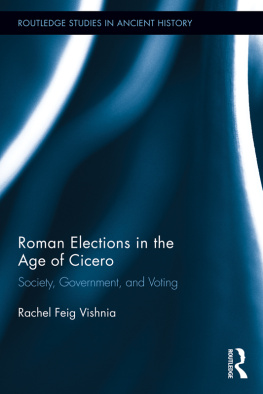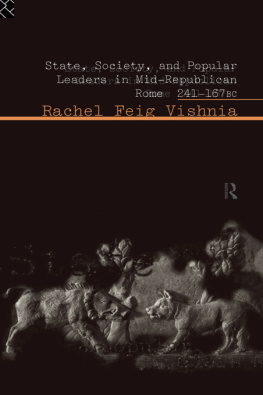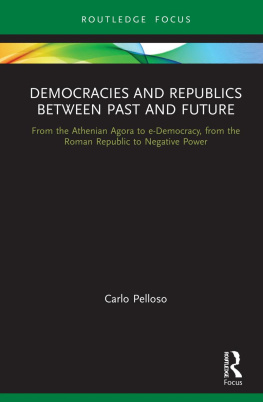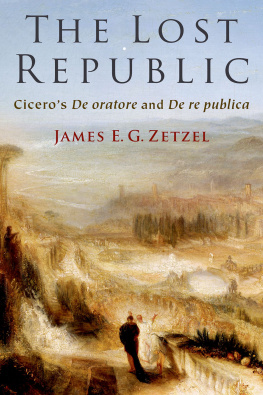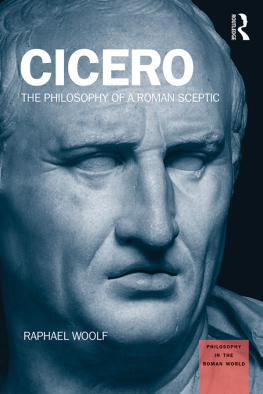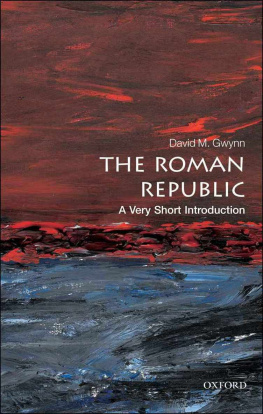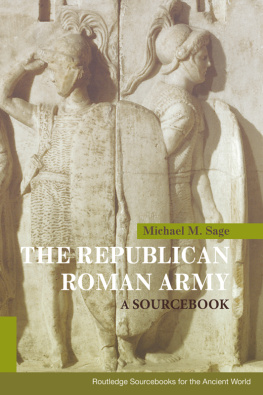Roman Elections in the Age of Cicero
Routledge Studies in Ancient History
1 Cicero and the Catilinarian Conspiracy
Charles Matson Odahl
2 Ancient Graffiti in Context
Edited by Jennifer Baird and Claire Taylor
3 Roman Elections in the Age of Cicero
Society, Government, and Voting
Rachel Feig Vishnia
Roman Elections in
the Age of Cicero
Society, Government, and Voting
Rachel Feig Vishnia

First published 2012
by Routledge
711 Third Avenue, New York, NY 10017
Simultaneously published in the UK
by Routledge
2 Park Square, Milton Park, Abingdon, Oxon OX14 4RN
Routledge is an imprint of the Taylor & Francis Group, an informa business
2012 Taylor & Francis
The right of Rachel Feig Vishnia to be identified as author of this work has been asserted by her in accordance with sections 77 and 78 of the Copyright, Designs and Patents Act 1988.
All rights reserved. No part of this book may be reprinted or reproduced or utilised in any form or by any electronic, mechanical, or other means, now known or hereafter invented, including photocopying and recording, or in any information storage or retrieval system, without permission in writing from the publishers.
Trademark Notice: Product or corporate names may be trademarks or registered trademarks, and are used only for identification and explanation without intent to infringe.
Library of Congress Cataloging-in-Publication Data
Feig Vishnia, Rachel, 1950
Roman elections in the age of Cicero : society, government, and voting / by Rachel Feig Vishnia.
p. cm. (Routledge studies in ancient history ; 3)
Includes bibliographical references and index.
1. ElectionsRome. 2. RomePolitics and government26530 B.C.
I. Title.
JC85.E4F45 2011
324.937'05dc23
2011032046
ISBN13: 978-0-415-87969-9 (hbk)
ISBN13: 978-0-203-13329-3 (ebk)
In Memoriam
Zeev (Zeevik) Rubin
(September 23, 1942May 28, 2009)
Contents
Preface and Acknowledgments
This book is an extensively revised and updated version of my book Elections, Elected and Electors in Late Republican Rome, which was published in Hebrew by Tel Aviv University Press in 2008. The original version includes a translation into Hebrew of the fragments of Marcus Tullius Ciceros speech In Toga Candida as preserved by Asconius and of the Handbook of Electioneering (Commentariolum Petitionis) attributed to his brother Quintus Tullius Cicero. Since there are good translations of these texts in English, I did not deem it necessary to provide yet another translation.
Some two and a half decades of teaching courses on the Roman Republic to students who had practically no prior knowledge of this period (and at times no interest either), and yet who evinced lively curiosity whenever we dealt with topics that still have great relevance for societies todayled me to believe that a book designed as a teaching aid, combining the basics of Roman history, society and government with an examination of a key feature of the republican political culture that readily lends itself to comparison with modern phenomena, could be useful to both undergraduate and graduate students, as well as appealing to a wider readership.
It was only natural to concentrate on elections, perhaps the most prominent and constant feature of Roman republican politics. For about a half a millennium elections were held every year for the various annual senior magistracies (whose number increased over this period, reaching 44 during the last three decades of the Republic). The designate magistrates, who had been elected only after vigorous canvassing, did not enter office immediately after the elections, but only several months later. Consequently, no sooner had the sounds of campaigning died down and the results of one election announced than the city of Rome began girding itself in preparation for the next one. Thus, for example, Marcus Tullius Cicero, who was elected as consul for the year 63, launched his campaign as soon as the results of the elections for 64 were announcednamely, in July 65.
Although it is evident that the patterns of Roman elections changed over time, the sources that have survived relate to the period chosen for discussion in this book, namely the Age of Cicero. The ample Ciceronian corpus together with the writings of Sallust, Plutarchs biographies of the key figures of the period, relevant chapters from Dio Cassius, and many other subsidiary ancient authors, provide a rare picture of the Roman political scene in general and of elections in particular.
The book attempts to build knowledge gradually: Part I offers a brief historical overview of the history of the Republic until Caesars crossing of the Rubicon in 49, which heralded its collapse. It is not intended to be a substitute for textbooks providing a detailed history of the Roman Republic, but is rather designed to present the backdrop to the period in question and to highlight the problematic issues that characterized it. Part II explores Roman society, its administrative, fiscal, and social divisions, while explaining its hierarchies, intricacies, and peculiarities. Part III serves as a short but comprehensive introduction to the republican system of government, presenting the interrelations between the three Polybian elements. Part IV deals with elections and electioneering, investigating this important and vital element in Roman republican culture via questions relating to modern elections, thus providing a different viewpoint on Roman elections. In this part, the knowledge acquired from the previous chapters allows for a more elaborate discussion on elections and their significance.
The various parts are divided into multiple short sections that can serve as manageable independent teaching assignments and convenient points of reference. Naturally, in a book such as this, some topics appear more than once, since they are relevant to a variety of contexts, so that it was not always possible to avoid repetition. Abundant cross-references allow easy browsing and access to topics that have multifarious relevance. This also makes the book accessible to a wider audience interested in political history in general and electoral practices in particular.
It is of course impossible to address Roman elections during the last decades of the Republic without taking into consideration the lively, contentious, and ongoing discussion kindled by Fergus Millar some two and a half decades ago on the role of the masses in an aristocratic regime and on the nature of Roman republican government. I chose to engage with this debate by focusing on elections because of their dominant role and significance in shaping the political scene of the Roman Republic, and hence their ability to shed some additional light on the mechanisms and problematics of the republican system of government.
All translations are from the Loeb classical series (sometimes with minor changes), and all dates, unless otherwise stated, are BCE.
On completion of this book, it is a real pleasure to thank friends and colleagues who helped me bring it to fruition. I am grateful to Jonathan Orr Stav who translated the original Hebrew version into English. Although I revised the text profoundly, taking off many paragraphs and some chapters while adding new ones, his lucid translation greatly facilitated the reassessment and revision of the original work. I am greatly indebted to my dear friend, Philippa Shimrat who polished the English and provided, as usual, very sound advice on the books content. To Avi Laniado and Rachel Zehnik-Abramovitz who helped me in the labourious task of proofreading, to Merav Haklai and Oded Arbel for their useful remarks, and to Amnon Jackont, who volunteered to read the text as a representative of the wider public, for his sound judgment and notes. I am most grateful to Aviad Kleinberg, head of Tel Aviv University Press for his generous help with both versions. To Laura Sterns and Stacy Noto of Routledge, and Eleanor Chan of IBT Global, for their cooperation, encouragement, and patience.
Next page
